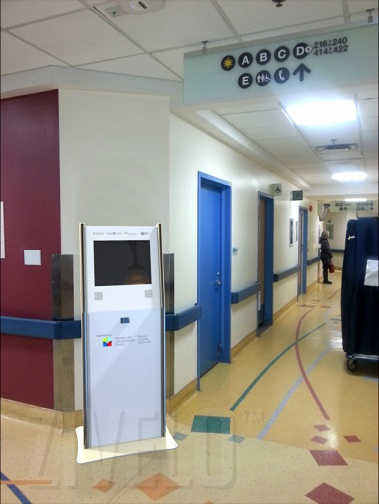 Self check-in kiosk to be installed in MUHC radiation oncology clinic.Easy-to-use kiosks being piloted in the MUHC radiation oncology clinic
Self check-in kiosk to be installed in MUHC radiation oncology clinic.Easy-to-use kiosks being piloted in the MUHC radiation oncology clinic

Waiting and doctors’ appointments are a fact of life. After all, they don’t call them waiting rooms for nothing. The Rossy Cancer Network (RCN) and its partner hospitals, however, are working to change this situation. An RCN team is set to launch a pilot self check-in project that will improve the waiting room experience for cancer patients. The new system will allow patients to quickly and easily register upon arrival for doctor’s appointments or treatments in the radiation oncology clinic at the McGill University Health Centre (MUHC).
This fall, three self check-in kiosks will be installed in the clinic’s two waiting areas. Patients will simply scan the barcode on their medicare card at one of the kiosks. This will let the clerk and the health care team know they have arrived for their doctor’s visit or radiation treatment. The patients can then take a seat until they are called for their appointment.
The goal is to reduce the time it takes to register
The radiation oncology clinic at the MUHC is an extremely busy medical unit with approximately 46,000 patients arriving annually for treatments or consultations (approximately 200 patients per day, mostly in the morning). Many of these cancer patients are frail and elderly. Right now, during peak periods, patients can wait up to 10 minutes to register with the clerk at the reception and information desk, the first step to seeing their physician. Patients arriving for a doctor’s appointment take a paper number from a stand and wait until a clerk calls out their number. Because there is no electronic display indicating the number being served, patients have to stay vigilant or they might miss their turn.
“Patients have expressed their frustration with the current system. Our goal with the pilot project is to increase patient satisfaction and enhance patient flow by making the registration process more convenient and faster for patients,” says Dr. Tarek Hijal, MUHC radiation oncologist and the project co-lead. “The new system will be easy to use and we are confident it will be less stressful for patients.”
One project, two mandates
The second mandate of the pilot project is to conduct a feasibility study to see if the self check-in technology is compatible with the computer systems used in other cancer clinics. If compatible and provided the pilot project delivers on anticipated benefits, the RCN team could rollout the system first in the medical oncology units at its partner hospitals (St. Mary’s Hospital Center, Jewish General Hospital (JGH) and MUHC) and eventually in other cancer clinics across the network.
The JGH installed self check-in kiosks in its radiation oncology unit several years ago. The JGH will use lessons learned from the RCN pilot project to decide if it will introduce the self check-in system throughout the hospital.
Benefit: More Time to Help Patients
“We anticipate the new electronic self check-in will allow clerks to spend more time with patients,” says Ms. Annie Rompre, administrative specialist at the JGH and project co-lead. “Patients often have questions about their care and treatment plans. They might need assistance filling out forms or setting up appointments with specialists. They often have queries about blood tests, medical exams or referrals. The new self check-in system will give clerks more time to help cancer patients manage their care and navigate the health care system, which is a significant benefit and addresses the RCN’s core goal of providing outstanding and compassionate care.”
The self check-in project is a collaborative effort involving all three RCN partner hospitals. A multi-disciplinary team was created to move the project forward assuring that various aspects of its implementation (i.e., technical, clinical and administrative) were taken into account.
This pilot project is one of four quick-win projects the RCN team initiated last summer. Quick wins are projects designed to improve the patient experience that can be implemented within a six-month time frame.
The other three RCN quick-win projects are:
- Piloting an electronic distress screening system;
- Providing patients with more information regarding radiotherapy treatment and its short- and long-term side effects;
- Enhancing patients’ waiting room experience.
